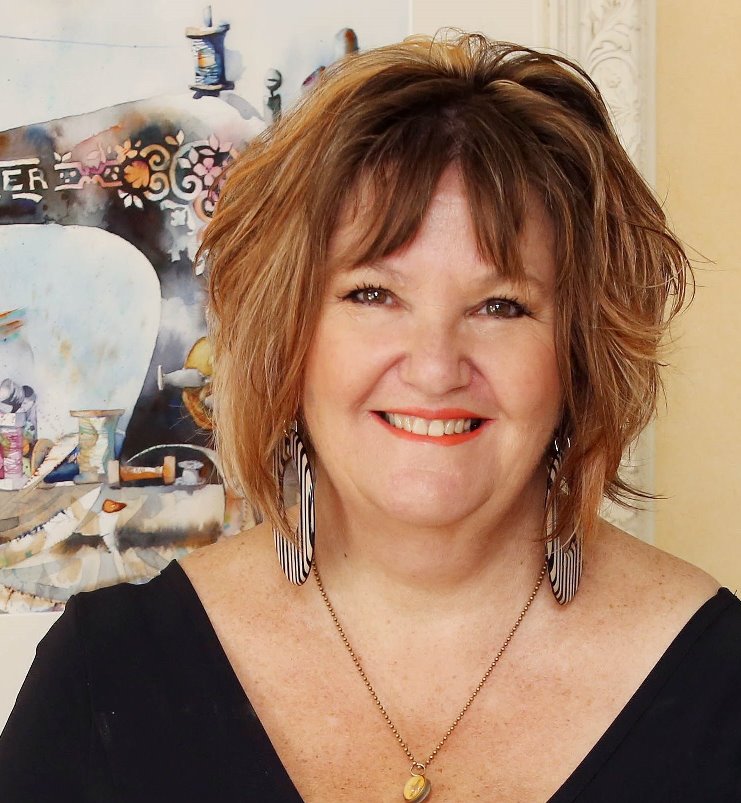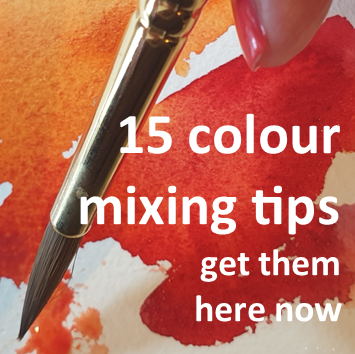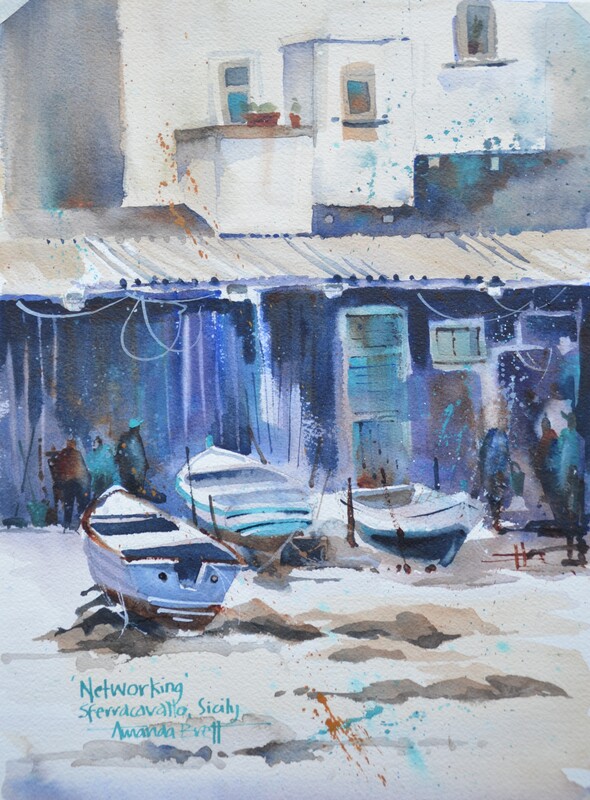 Networking, Sferracavallo Sicily Networking, Sferracavallo Sicily
I get many emails and questions about my palette, ie, the colours I have selected.
It took me a long time to get to this palette but once I decided it was an obvious choice. For what seemed an interminable length of time, I was on a continual search – what colour for this? What colour for that? In the end (really it was a new beginning) I selected transparent primaries that would allow me to mix super rich darks and any other colour, cool, warm – whatever I would need! My current foundation palette is made up of 3 transparent primaries plus Burnt Sienna (my most favourite colour and pigment). On my palette is Permanent Alizarin Crimson, Winsor Blue (Red Shade) and Quinacridone gold. Another primary triad I keep on my palette is Winsor Blue (green shade), Permanent rose and raw sienna. Temper this info in that I mostly use quinacridone gold and burnt sienna for mixing greens and neutralising. All these colours work beautifully together mixing secondaries and other cool or warm versions. Sometimes I dip into other workhorse pigments including French Ultramarine, Winsor Green, Yellow Ochre, Indian Yellow and cobalt blue. Avoid dependency on online colour "recipes", much of the fun in painting is playing with your colours and making your own discoveries everyday. Further this play will set you up for learning your likes and dislikes (eg colour, pigment, medium and paper etc) and lead you to your own process of creativity. I always start my day playing with colour which leads me into inspiration and more creative sessions. To be truthful, going to the art shop is like going to the candy store … so hard to resist all those amazing colours!! Further, its even harder to resist sets of colour! However, I find a set of colours is like buying an eyeshadow palette, half of which I won’t use. In the long run it’s better and more economical to choose a foundation palette of good quality transparent primaries plus a couple of “exotics” to make yourself happy!! See my vlog #129 As always, I am very grateful for every thumbs up, so please click below if you liked this article. I’d also love to read any comments on this theme, so let me know your thoughts below. Ciao cari pittori
0 Comments
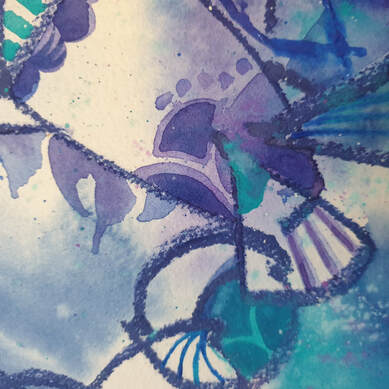
We’ve discussed in class many times and I’ve had it on my mind to write about how to choose colours but have never quite gotten to getting it on paper!
It’s a BIG subject and once you know a little the rest is dangerous!! Lol!! There are many ways to choose colours but maybe 3-4 types that can be simplified (unless you want to find out more about colour theory):
Firstly, an optimum way to simplify is to have a set of primaries and mix your neutrals and then add strategically placed splodges of high chroma colour to add accents and interest. An excellent way to work on your colour mixing and develop your knowledge of your colours and how they work together. For painting some form of realism and local colour (the colous you see in a scene), I use mostly the same pigment colours in every painting or at least versions of. These colour pigments are my workhorse pigments, I can mix every tone, every shade, value and colour. Sometimes I swap a cool for a warm version or vice versa. To start with it’s worth understanding the pigments you already have and what you can do with them It's not always prudent or practical to go and buy another tube of paint, let's face it, is it pragmatic to own 100 tubes of paint, 90 of which you won’t know what to do with? Further, if you’re painting realism eg landscapes, there are few colour pigments true to nature. To start just get the transparent pigments I recommend, and mix your own colour wheel. This will show you the strengths and weaknesses of the pigments - how rich and dark, their tinting strengths and other characteristics. The key is to understand the colour wheel you've created and continue to play with those colours to develop a deeper understanding. Whether I’m painting out or in my studio I often follow a process of primary colours but I might swap one of them out just to zhuzh (thanks Suzanne!!) things up a little. For example, a warm blue for a cool, cool red for a warm etc, you get the drift. Secondly, for many years I focussed on a split complementary palette. For example, orange is opposite blue on the colour wheel, so I might decide blue is my dominant colour but instead of orange I could use the hues either side of orange (red orange and yellow orange) and maybe step one to a tint the other to a shade. Check out the other colour selection diagrams on a proprietary colour wheel for additional ideas and colour concepts to play with. Another favourite palette is a tertiary palette (colours mixed from primaries), sometimes this just falls out of my brush, sometimes it seems the obvious choice, however, it feels a natural palette to paint with and I‘m often pleased with the results. For any style or genre of painting, dominance is the key to life!! Abstract or realism, I try to find a foundation colour that speaks to me for that subject that day for my mood at the time. Yesterday I painted warm blues, the day before was all about cool greens. I painted warm blues yesterday and cool greens the day before. Effectively I piled up all my greens, played and chose from there. In my early days of painting watercolour, playing with colour was the key to my inspiration. Even a plein air painting/study benefits from a limited palette. My all-time favourite is “Early morning” with a pink (alizarin crimson) underpainting and “Networking” with a cool buff/grey/sludgy dominance and the subject in warm and cool blues with an accent of cool opaque blues and burnt sienna. Sometimes I just have a hankering to paint pink and then tomorrow green. I have been known to select every pink then add a splash of orange and a sweep or two of turquoise, it just depends on where the mood takes me. What colours do you like? Head down to your local art gallery and actively search for colour combinations, whether you like the paintings/art or not, its a good exercise in palette selection and most importantly, discovering your own likes and dislikes. let me know how you get on - leave a comment!! :) 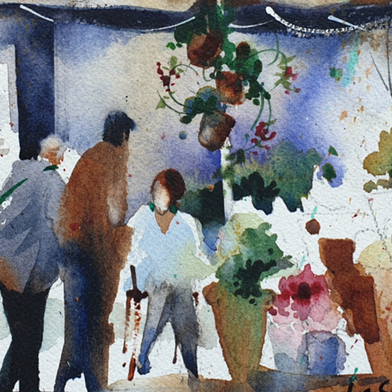
There’s a lot of confusion about underpainting in watercolour. It’s somewhat similar to underpainting – or blocking-in in other mediums. In other words blocking-in colours strategically (or playing it wild to leave strategy at the door!). I have 2 processes for underpainting:
There’s another idea to consider: You can either leave it to dry or keep painting into it while it’s wet/damp becoming dry. Most watercolour painters are reluctant to paint into wet or damp but, personally, I find this the most fun, rewarding and absorbing element of watercolour. Just use thicker paint/less water and having a play with placing values to tell your story. Like me, you might need to change your brush to accommodate the amount of water you need so you can avoid blooms where you don’t want them. I map my painting out and consider my process before I start. For example, I need to know where to place the yellow for a lemon if I want a yellow lemon (next lemon with be pink!!). I stick with transparent colours and leave opaque and granulating pigments for later, this way I know that everything will work together nicely. Remember, for brighter more saturated colour, if you want purple, paint purple on top of purple, if you want red, paint red over red and so on. For more neutral colours, glazing complementaries over your under painting can have incredible effects. Having said this, one of my students pulled out an old painting with a French Ultramarine background. She overpainted with reds and yellows – I was so pleased that she made it work – fearless – excellent - ‘nuff said!! Underpainting in watercolour can enhance your colours making them stronger, richer and more exciting. Soft-edged background shapes add depth, volume and mystery, further, continuing while damp add richness of colour and value plus more soft edges becoming harder edged as the paper dries. Totally delicious!! By this time your painting is probably dry (or you need a break!) and your painting will be ready for some calligraphy detail marks with some lovely rich colour straight from the tube – can't beat it! Give your painting a final check – does your painting say what you want it to say? The cool thing is you don’t have to decide right now!! But do consider if it looks balanced, pleasing? Is there anything annoying you? I just discovered a problem area in a painting I thought I had resolved – so annoyed as I deliberately added “the problem” thinking I was so clever! Prop your painting upside down so you can see when you are walking past, this will give you a better understanding of the composition and structure, if it looks right upside down it will be right in its frame!! ciao cari pittori let me know what you think in the comments below!! |
AuthorPaintBox Tips, secrets, random thoughts, Poetry in watercolour is made in the freedom of the here and now. Amanda Brett Inspiration exists, but it has to find you working - Pablo Picasso There are no mistakes in watercolour, just some extra surprises!! Categories
All
What my readers and viewers have to say
Your emails are so informative! I must confess I've watched a couple of your demos from beginning to end, and it makes me want to watercolor!!! I've only ever painted with oil or acrylics and haven't know how to begin with WC. Your content is excellent!
Susan VN Hi Amanda
Thank you for your tips. They inspired me to practise and I realised I haven’t been loading the brush properly. I learnt about adding more paint, and not water, to washes. In today’s tips I like the idea of painting with purpose. Your tips are very helpful. I very much appreciate receiving them. Elizabeth Hi Amanda I enjoyed your post and generous tips. Looked up Dan Burt I begin to see that you can colour any subject to give it pizazz so long as the tone and form is correct Certainly adding value now to my attempts Thanks heaps Annie
Yes very wise words. Agree with not fussing and agree with comments about good quality paint. Well written and inspirational as always. Cheers Janet xxxx Archives
July 2023
Copyright © 2022 All images and text on Amanda's blog and website are the the legal property of Amanda Brett and may not be reproduced without express permission from Amanda Brett or her authorised agent. Thank you for respecting her art and the livelihood of all artists.
|



